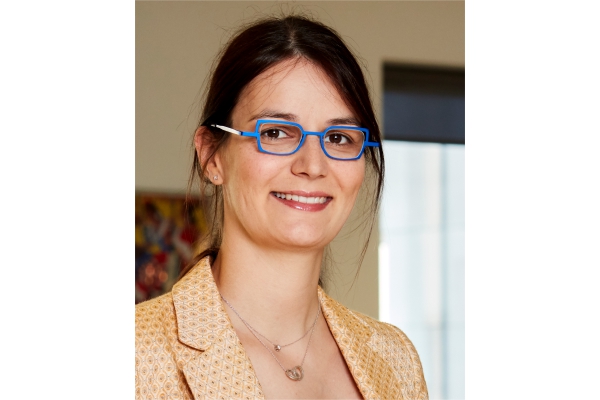 Emilie Allaert, Head of Luxembourg Blockchain Lab;
Emilie Allaert, Head of Luxembourg Blockchain Lab;
Chronicle.lu recently had the opportunity to speak with Emilie Allaert, Head of the Luxembourg Blockchain Lab, a joint initiative between Infrachain, the Luxembourg House of Financial Technology (LHoFT), the Luxembourg Institute of Science and Technology (LIST), the Interdisciplinary Centre for Security, Reliability and Trust (SnT) and Letzblock, which specialises in research, education and industry projects in blockchain technology.
Technically, blockchain is a type of digital ledger technology (DLT) with a growing list of records, also called "blocks", which are securely linked together via encrypted cryptography algorithms. Outside academia, blockchain technology gained much of its mainstream attention after its use in cryptocurrencies such as bitcoin, amongst other applications, primarily due to its decentralised and distributed nature, and often publicly available digital ledgers. What makes this technology particularly attractive to the financial sector is that the "blocks" (for example, payments, financial transactions, etc.) once added to a ledger, cannot be altered retroactively without altering all subsequent blocks, and therefore it is very difficult to change or manipulate the "ledger" without leaving a digital trail. Moreover, since many of these ledgers are decentralised and publicly available, anyone can verify the ledger for the chain of authorised transactions (blocks) in an independent and inexpensive manner, making blockchain technology an ideal asset for any industry, business or service where there is a need to keep track of the commodity or services passing through a lot of hands or processes.
In this interview with Emilie Allaert, Chronicle.lu learned more about the role of the Luxembourg Blockchain Lab within this context.
Chronicle.lu: What is your company's business area / main focus?
Emilie Allaert: The Luxembourg Blockchain Lab is the Luxembourg innovation cluster dedicated to everything related DLT. It is a non-profit initiative which aims at disseminating information about the technology to the wider group, in an agnostic way. One of its kind, the Luxembourg Blockchain Lab has a focus on Sustainable Development Goals (SDGs), which means that the Lab is convinced the DLT technology can be used to do good and promotes this approach. Next to this initial mission, the Lab, thanks to its growing ecosystem, can present concrete solutions using DLT. Because more than words, we need actions and solutions. To implement these solutions, we need to gain the knowledge; this is why the Luxembourg Blockchain Lab is associated with the Digital Learning Hub, the House of Training and other organisations to provide dedicated trainings to a wide range of public. The future of tomorrow is created today. We educate, we provide the skills needed to the future economy.
Chronicle.lu: How did this opportunity present itself? Is it (partly) due to the changing regulatory landscape?
Emilie Allaert: This opportunity presented [itself] when I started at the LHoFT in 2017, I did some research on the topic of ICOs (Initial Coin Offerings) which was booming at the time. Since then, I have been dedicating most of my time to learning more about Blockchain. As part of my work at the LHoFT, I had the opportunity to participate in the creation of the Lab which I am now leading.
Chronicle.lu: What makes your company / product / service special or unique?
Emilie Allaert: We are filling the gap between long-term research projects and the immediate needs of the various industries. We do not focus on the technology used nor the industry, we want to demonstrate that more than ideas, there are existing solutions using DLT technology and they can be used to do good. We are also providing trainings in a wide range of domains. Finally, we help the various industries to find a solution and have a pilot in a timeframe of eight to ten months.
Chronicle.lu: Please describe your company's business model (how do you generate income?).
Emilie Allaert: We are a cluster. We benefit from the support of our five founders, [namely]: Infrachain, the LHoFT, Lëtzblock, the LIST and the SnT. Next to that, all the funds received for the trainings and our other activities are put towards running the Luxembourg Blockchain Lab. We are a non-profit organisation.
Chronicle.lu: During this quiet holiday period, what are you focusing on? Are you financing the startup yourselves, or have you attracted / are you trying to attract investors?
Emilie Allaert: We are reaching out to the ecosystem as well as organising the Luxembourg Blockchain Week which will happen for the first time, in person, in Luxembourg from 3 to 7 October 2022 (www.blockchainweek.lu). There are plenty of ideas fusing to make it a great event and there is a lot to do around this. We also worked with the Digital Learning Hub to define the curriculum around Blockchain for the winter semester. We are also planning the activities for the beginning of next year.
We are also creating partnerships to help us finance the Luxembourg Blockchain Lab in the long term, defining value-added partnerships.
Chronicle.lu: In what way(s) do you think Luxembourg is the right place to fulfil your business goals?
Emilie Allaert: Luxembourg has an economy which is always looking to grow and regenerate itself by diversifying. Luxembourg is in constant evolution and we need to provide the support for it. The Luxembourg Blockchain Lab is there to help people acquire the future skills needed and help Luxembourg bring new business opportunities. The Luxembourg Blockchain Lab is there to demystify the technology and provide the necessary tools to use it in innovative ways, in line with the latest developments in terms of regulation or environmental-friendly technology.








